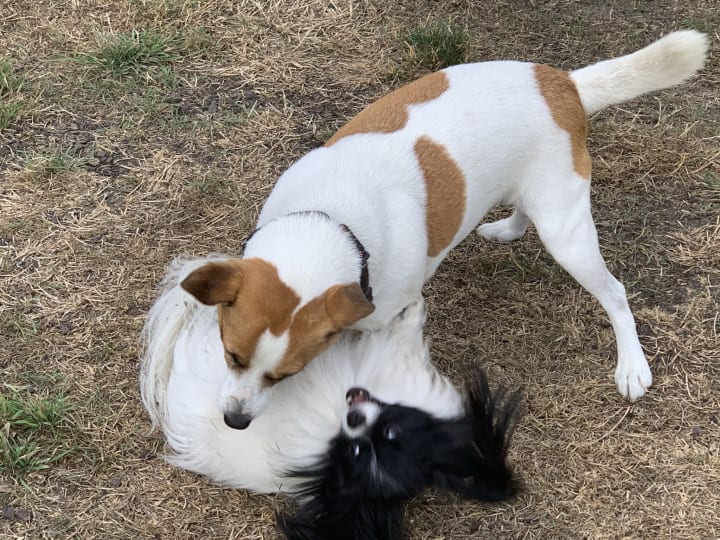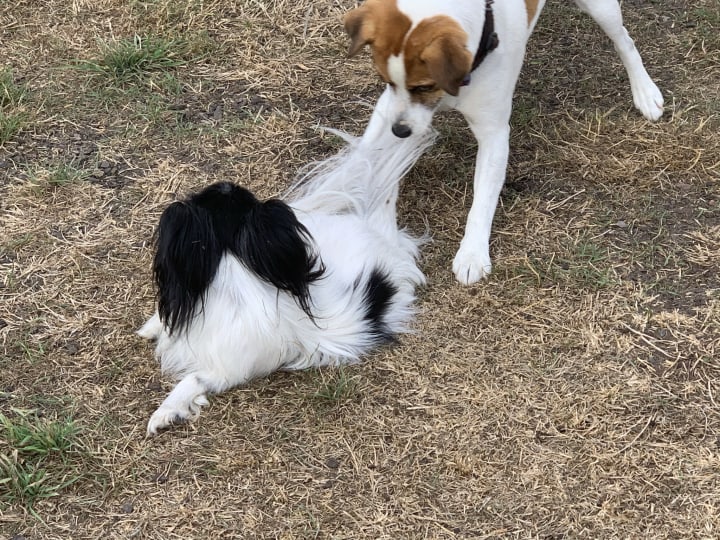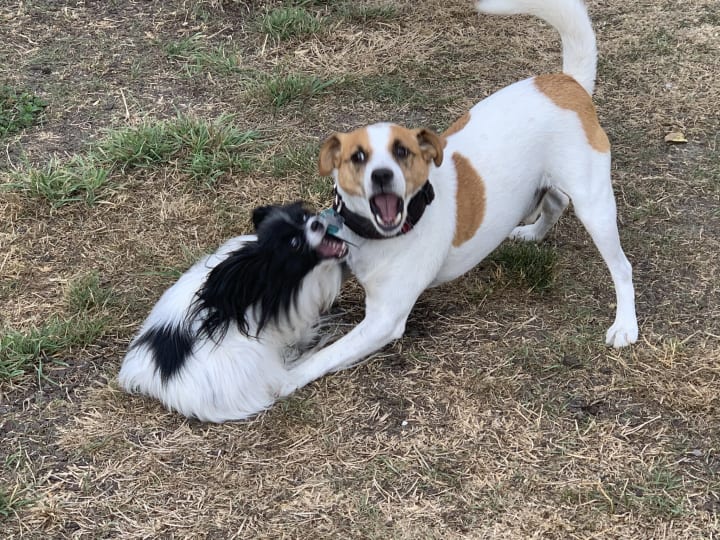What is love? How we connect with others
Writing tips from the other side

It looks like love, right? Looking into each others’ eyes, like that, it sure looks like a moment of affection. In the midst of their play the other day, my dogs paused and looked at one another. It was the briefest of moments, captured accidentally as I photographed them rough-housing in the backyard.
It might not be love—though I often see them “kissing” or, rather, licking each other’s mouths by way of greeting. After all, I can’t know what it is they’re feeling. But I do know something of what’s going on. It is possible to get an idea of what’s happening here, just by studying the photograph and recalling how they were interacting at the time.

Whatever they were feeling, they were involved in a game that required them to consider and anticipate each other’s actions. I know this because Maggie, at 1.9 kg, isn’t a match for Jack, who weighs more than four times that. If she or he didn’t take stock, she’d really suffer for it.
In the two years they have lived with me, they have wrestled and tousled hundreds of times.

Maggie might squeak from time to time to let Jack know when he’s gone too far (usually by pulling her tail), but despite their difference in size, he is able to take stock of her tiny frame and avoid hurting her.

Of course, that doesn’t stop me from stepping in sometimes to tell him he’s playing too rough, or because I think she’s had enough. When that happens, it’s because I’ve heard her squeal, or seen her race under the sofa to escape him. In other words, I intervene when I think she’s in distress. It’s guesswork, for sure, but when I intervene it’s because I have an idea about how she’s feeling.

That’s what we do, isn’t it, when we care for another? We take their part. We consider their position. We try to imagine their experience in the moment in order to understand what they might need from us. When a baby cries, when we see someone struggling with a load, or looking lost, or when we sidestep to allow room for on comers when walking along the pavement, we are taking a perspective other than our own. We are imagining and anticipating the needs of the other—that’s why we sometimes end up doing impromptu dances in the street with total strangers: we step to the left, they step to the right, and on we go, mirroring each other as we strive to give way.
And here’s the (un)common knowledge. It’s something we don’t know we already know. It’s to do with love. It’s to do with emotion. It’s about feeling in the most basic sense. And it’s about emotion and how feelings (good or bad, pleasant or unpleasant) intensify to the point where we notice them.
When we notice our feelings, we tend to categorise them. We might say to ourselves: this is love, or maybe it’s anger, or sadness or fear, or shame, or joy.
Whatever the emotion, at the heart of every such feeling there is this thing that we all do when we take stock of others and try to anticipate what they might need from us.
It’s called perspective.
Perspective-taking is at the heart of just about everything we do. As we navigate our day, taking perspective helps us keep on track, out of trouble, and in the good books with those who matter in our lives. It keeps us on our path, however we choose to walk it.
I’m talking about a skill you began to develop from childhood. You’ve already mastered this skill if you’re reading this. It grows with us, and we hone it throughout our lives. In fact, you are so adept at perspective-taking, you hardly notice that you’re doing it. Whether it’s the simple reading of your material environment so as to move safely through the cluttered spaces of our modern world, or the rapid interpretation of a situation when you walk into a social space (at home, at work, at the supermarket or a local cafe), you read these spaces, taking the measure of what people might be thinking and doing, and you manage your behaviour accordingly.
Human culture is built on these processes. It is the outcome of every individual managing their emotional, social, and physical spaces in ways that are responsive to one another.
I wrote, in an earlier essay “Are You Sitting Comfortably,” how our feelings are messengers in an internal appraisal system that keeps us on track in our daily lives. We use our bodies and our minds to get a sense of how we’re doing. Perspective-taking is a mental process—a strategy that supplies important information to us about our social and material world. When that information indicates something important, we become even more attentive to the situation. In the context of danger, this involves understanding the physical space and working out the attitude and mindset of any other person in that space. We can see this represented in films and in novels, when characters are shown walking into a veritable hornets nest of strife. The protagonist usually plays it cool, but you can see, by the way they scan the room that they are taking stock. Perspectives on the physical space and the mindsets of the antagonists determines the hero’s actions. Writers know this. They know that we, the audience, will recognise the fundamental actions involved in reading the room. And they work these features of thought into the protagonist’s subtle movements in the lead up to a battle or fight.
We don’t need to be in danger for perspective to play an important part in our lives. Our ordinary feelings—those simple measures of the situation when we appraise something as either good or bad for us—become complicated by the variability and ambiguities of life. Things might feel goodish, with a touch of doubt, for example (doubt, because there’s a tiny flurry of discomfort beneath the overall positive vibe). Or the things that we recognise as being bad for us, which cause our body discomfort over the long-term, might provide immediate rewards that cause us to overlook this.
Sometimes it’s food, alcohol or other drugs that send us these mixed signals. Sometimes it’s another person. In love, we go back and forth, trying to understand how the other person sees us. Sometimes the reading we take is disappointing or worse. Then we feel bad—possibly even sad or depressed. Sometimes the vibe is good and we want some more of it. And so we gaze into the eyes of our loved one, sending each other reassuring signs of our affection.
Even when the relationship is good for us, we have to keep it on track by checking in. That’s what my dogs were doing the other day in the midst of their play. These check-ins were probably happening all throughout their game—along the way, a quick glance to make sure the other is happy and still having fun. That’s just ordinary life. We do this with our kids, our parents, our friends, our co-workers, our lovers.
These little micro-check-ins do more than keep us on track. They give us a re-assuring feeling when the vibe is good, or indicate that a course correction is needed when the vibe isn’t so good. Whichever way it goes, these moments add up. Our perspective-taking on the other (as in, how are they seeing me right now? Am I doing good or bad in their eyes?) leads to a build up of feeling that accrues over time into a recognisable emotion.
When our feelings intensify, they call attention to themselves, activating our thought processes as we try to understand—is this love? or is it just something I ate that’s causing that fluttering in my stomach and this light-headed feeling?
In the broadest sense—that is, taken out of any specific or individual context (yours or mine), love is built on perspective. Love is an intensification of feeling brought on by perspective-taking. But so is anger. And shame is definitely embroiled in appraisals of perspective.
As we go back and forth between our own view on things and the views that we imagine others hold, our feeling get more and more involved. If you hang onto thoughts about an embarrassing situation, if you rehash your memories of what others did and said, if you reflect on what they might have been thinking, your embarrassment will only intensify until you feel angry or ashamed. In positive contexts, remembering and reflecting on loving experiences, reacquainting yourself with those experiences by building more episodes of mutual affection into your relationships, will intensify your feelings of love.
The upshot is that perspective-taking, when it becomes intensely involved in our appraisal of a situation, becomes the stimulus to further feeling, sometimes resulting in recognisable emotions like love, anger, fear, sadness, and shame. Knowing this can help you in life. But it can also help with your writing.
As a writer, you have a message to share. If you’ve been working at writing for a while, you probably already know that the more you tune into the feelings of others, the more you work at understanding the collective mood in your community, the better your chances of being heard.
You knew that already, I of course. I’ve just supplied the backstory to what is common knowledge—the thing you didn’t know you already knew, which is what makes it (un)common, after all.
I hope you enjoyed reading this article. From my perspective, it’d give me a buzz if you ❤️ and shared this.
About the Creator
Victoria Reeve
Creative writer and academic, specialising in theories of narrative emotion and reader involvement.
Enjoyed the story? Support the Creator.
Subscribe for free to receive all their stories in your feed. You could also pledge your support or give them a one-off tip, letting them know you appreciate their work.






Comments
There are no comments for this story
Be the first to respond and start the conversation.